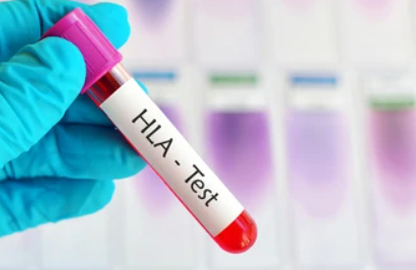

- Complete blood count (CBC)
- Tumor Markers
- Blood protein testing
- Circulating tumor cell tests
- ctDNA
Complete blood count (CBC)
A complete blood count (CBC) measures three types of blood cells circulating in your bloodstream.
The results can help healthcare providers diagnose cancer or Detect whether cancer has spread. Some cancer treatments can affect blood counts, so your healthcare provider may recommend regular CBCs as you’re going through treatment. Each type of blood cell has a range that’s considered normal or healthy. Labs use ranges because the number can vary from person to person or within the same person from day to day. The three cell types are:
- Platelets, which help blood clot.
- Red blood cells, which deliver oxygen throughout your body. Red blood cells may be measured in two different ways. Haematocrit is the proportion of red blood cells in your blood. The normal range for men is 40% to 55% and for women is 36% to 48%. Hemoglobin is a protein in red blood cells.
- White blood cells, which fight infection.
Many factors can affect your CBC. Your healthcare provider will help you understand what your numbers mean. The results must be considered along with other factors, such as symptoms and additional test results.




Tumor Markers
A tumor marker is anything present in or produced by cancer cells or other cells of the body in response to cancer or certain benign (noncancerous) conditions that provides information about a cancer, such as
- Estimate prognosis or how aggressive it is,
- What kind of treatment it may respond to, or
- Whether it is responding to treatment.
- Detect cancer that remains after treatment (residual disease) or that has returned after treatment
- Monitor whether the treatment has stopped working
Tumor markers have traditionally been proteins or other substances that are made at higher amounts by cancer cells than normal cells. These can be found in the blood, urine, stool, tumors, or other tissues or bodily fluids of some patients with cancer. Some are associated with only one type of cancer, whereas others are associated with multiple different cancer types.
Some examples are as follows:
- Alpha-fetoprotein (AFP) for liver cancer
- Beta 2-microglobulin (B2M) and lactate dehydrogenase (LDH) for blood cancers
- Calcitonin for thyroid cancer
- Cancer antigen 125 (CA 125) for ovarian cancer
- Cancer antigens 15-3 and 27-29 for breast cancer
- Carcinoembryonic antigen (CEA) for colorectal cancer, lung cancer, stomach cancer, pancreatic cancer and others
- Human chorionic gonadotropin (HCG) for testicular cancer and ovarian cancer
- Prostate-specific antigen (PSA) for prostate cancer.
Measurements of circulating tumor markers are usually combined with the results of other tests, such as biopsies or imaging, to diagnose cancer. Tumor markers may also be measured periodically during cancer therapy. Such “serial measurements,” which show how the level of a marker is changing over time, are usually more meaningful than a single measurement. Circulating tumor markers may also be measured periodically after treatment has ended to check for recurrence (the return of cancer).



Blood Protein Testing
Blood protein testing uses a special process called electrophoresis to find certain proteins in your blood. The proteins are called immunoglobulins, which your immune system releases in response to diseases such as myeloma.
- Serum Protein Electrophoresis
- Immunoglobulin profile
- Free light chain assay